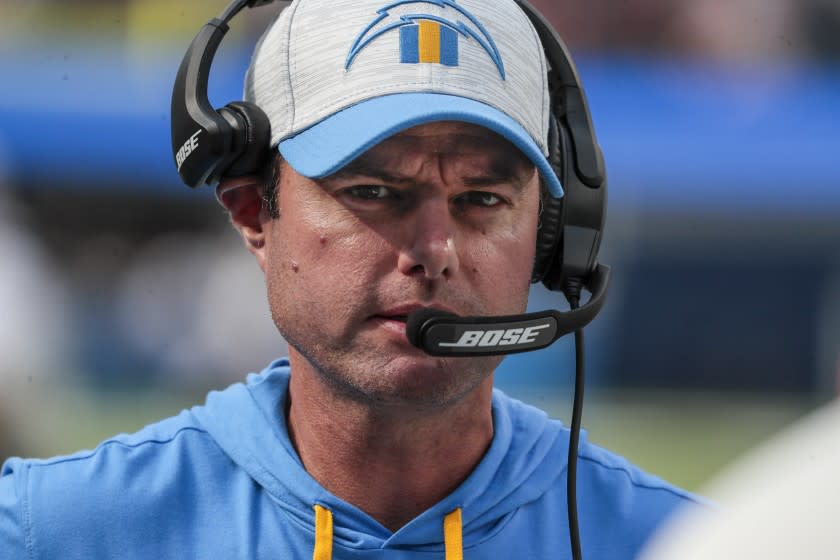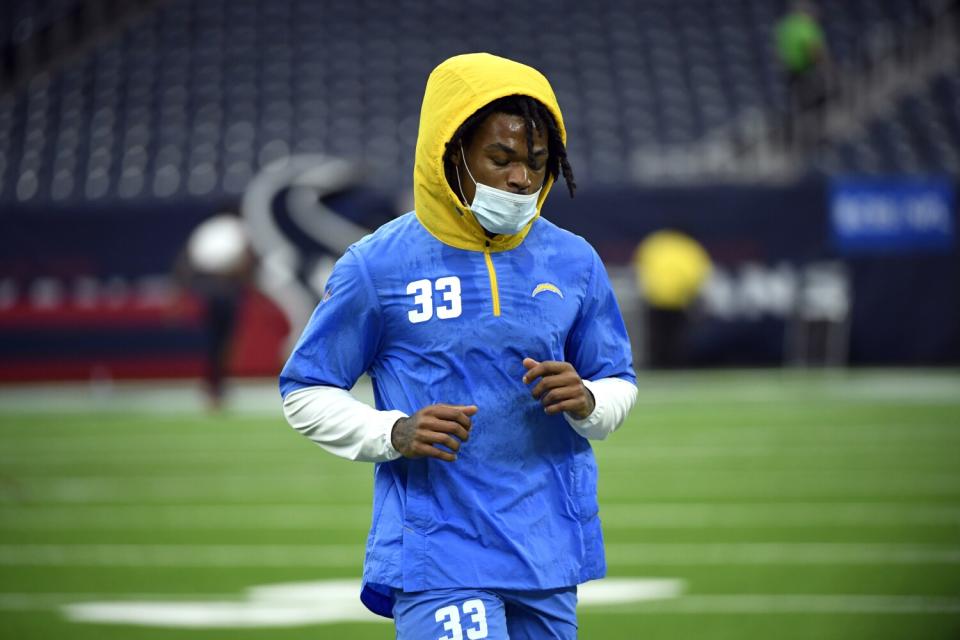News Analysis: Chargers must upgrade the defense to become an AFC contender

No player among the 2021 Chargers was discussed more than Justin Herbert, who guided the offense to a top-five finish while earning starter status for the Pro Bowl.
All that talk can stop now.
Looking forward to the 2022 Chargers, the overriding topic is defense, the shortcomings on that side of the line of scrimmage costing Herbert the chance to make his postseason debut this weekend.
Sure, the Chargers need to address the right side of their offensive line, where injuries forced stopgaps Storm Norton and Michael Schofield to start for most of the season.
They have a decision to make on No. 2 wide receiver Mike Williams, who had a career year — 76 catches for 1,146 yards and nine touchdowns — as he enters free agency.
Veteran tight end Jared Cook also is set to be a free agent after he had the highest drop rate (12.7%, according to Pro Football Focus) among the team’s regulars.
And changes already have begun on special teams, coordinator Derius Swinton II and assistant coach Mayur Chaudhari fired after one season.
But defense is where the real work will be done as the Chargers attempt to mold the group to align more precisely to the specifications of head coach Brandon Staley.
“We really believe in how we play,” Staley said. “I think that it's getting the right people that fit that way … and then coaching our guys better, teaching our guys better, taking that ownership and that accountability.”
When Staley was hired one year ago Monday, the expectations for the Chargers’ defense rose immediately. He just had coordinated the Rams to a No. 1 finish in total defense, his scheme credited with elevating the play of so many.
But the Chargers gave up 100-yard rushers in Weeks 2 and 3 and 42 points in Week 5. They struggled all season on third down and couldn’t stop the run often enough, including on Las Vegas’ final drive that ended their season last weekend.
“I know people are going to talk about our results here with the Chargers as compared to last year where I was at,” Staley said. “But I felt like I coordinated as well as I ever have in terms of planning and preparation and game day.”
So, what was the problem then? Staley cited a lack of consistency that he said was the result of too many players missing too much time, either because of injuries or COVID-19.
While learning a new system, one Pro Bowl edge rusher Joey Bosa called “pretty complex,” the Chargers also were forced to deal with ever-shifting lineups, particularly up front and in the secondary.
“We just never had that cohesiveness of both units — the front end and the coverage plan — together,” Staley said. “I think that's why you saw up-and-down results.”
Among the starters, only edge rusher Uchenna Nwosu and linebacker Kyzir White were available for all 17 games.
Defensive tackle Justin Jones, a key presence against the run, was out for six weeks. Rookie cornerback Asante Samuel Jr., a starter from Day 1, missed five.

Safeties Derwin James Jr. and Nasir Adderley, cornerbacks Michael Davis and Chris Harris Jr., linebackers Drue Tranquill and Kenneth Murray Jr. and nose tackle Linval Joseph all missed multiple games.
The unsettled lineups left the Chargers particularly exposed in a system that relies on all 11 players working in unison for this defense to be most effective.
Also exposed by all the absences was a lack of depth — especially among the defensive backs — that was glaring on some Sundays.
“I think we laid a good foundation in terms of how we want to play,” Staley said. “Now, it's just updating our personnel and, the people that we do have, getting them in the right roles and making sure we continue to teach and develop the scheme better.”
Bolstering the defensive line will be “at the center of our thought process moving forward,” Staley said. Jones and Joseph both are scheduled to be free agents, with Joseph set to turn 34 in October.
Only two teams — Pittsburgh and Houston — were worse versus the run than the Chargers, who bowed out to the Raiders after Josh Jacobs rushed for a career-high 132 yards.
“Run defense is a product of playing team defense,” Staley said. “It's not just a front issue or an edge issue or a linebacker issue. It's a team-defense issue. You need all 11 guys to play run defense.”
Nwosu and White also are heading to free agency. Nwosu just finished with a career-high five sacks and White led the Chargers with 143 tackles.
Harris, who has more experience in this defense than any of his teammates because he played the scheme in Denver, also will be a free agent.
All of which means the Chargers could look quite different on defense next season, hardly shocking given their struggles in 2021.
After he was hired, Staley said one of his top priorities was to build an offense — in both personnel and system — that would allow Herbert to flourish. More than 5,000 passing yards later, no one is questioning how that worked out.
“I feel like we had to get that right,” Staley said, “and I know we got that right.”
Now, it’s the defense’s turn, the Chargers flush with the possibilities presented by having nearly $70 million in cap space, second-most in the league.
“I think that what you realize is things have to happen in a sequence,” Staley said. “You can't do everything at once.”
This story originally appeared in Los Angeles Times.

 Yahoo Sports
Yahoo Sports 